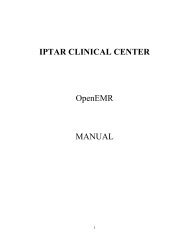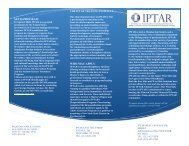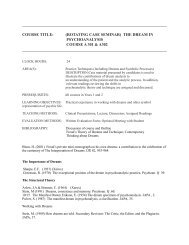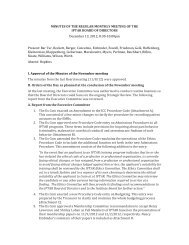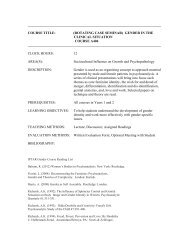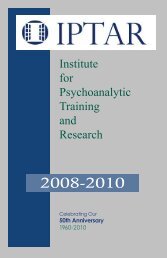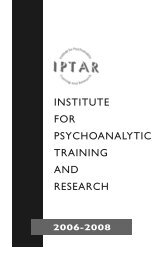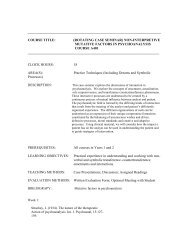IPTAR Bulletin - Institute for Psychoanalytic Training and Research
IPTAR Bulletin - Institute for Psychoanalytic Training and Research
IPTAR Bulletin - Institute for Psychoanalytic Training and Research
You also want an ePaper? Increase the reach of your titles
YUMPU automatically turns print PDFs into web optimized ePapers that Google loves.
“FriendlyVisitors” Program: An opportunity to work with the elderly<br />
is available to c<strong>and</strong>idates through the "Friendly Visitors" program at the<br />
Hebrew Home <strong>for</strong> theAged. There is ongoing group <strong>and</strong> individual supervision.<br />
Asylum-SeekersTreatment Program: In 2007,the ICC established the<br />
Asylum-Seekers Treatment Program, which offers pro bono individual psychotherapy<br />
to people seeking political asylum in the United States. Those seeking<br />
asylum must prove that they have been tortured or abused in their<br />
native country <strong>and</strong>/or are under the threat of being tortured or abused should<br />
they return to the country of origin. The legal process of obtaining asylum is a<br />
long <strong>and</strong> arduous one, which frequently results in retraumatizing or further<br />
traumatizing the asylum seeker. The patients treated by this program have very<br />
limited financial resources <strong>and</strong> suffer from the sequelae of severe psychological<br />
abuse.<br />
Ongoing research on the effectiveness of the treatment offered at the ICC is an<br />
integral part of our program, <strong>and</strong> the ICC co-operates <strong>and</strong> offers support to<br />
several ongoing research projects, including a study of children <strong>and</strong> adolescents<br />
seen at the ICC to determine the effects of treatment on their lives <strong>and</strong><br />
functioning.<br />
Therapists are eligible to attend workshops <strong>and</strong> seminars sponsored by the<br />
ICC. All <strong>IPTAR</strong> c<strong>and</strong>idates <strong>and</strong> members may become ICC therapists. Upon<br />
graduation, c<strong>and</strong>idates have the option to see their patients in their private<br />
practices or to continue at the ICC.<br />
46<br />
<br />
SECTION IV<br />
THE <strong>IPTAR</strong> MEMBERSHIP SOCIETY<br />
The <strong>IPTAR</strong> Society is a home <strong>for</strong> the community of <strong>IPTAR</strong> analysts. It offers<br />
opportunities <strong>for</strong> the continual reworking of our psychoanalytic identity<br />
through dialogue <strong>and</strong> reflection,in a dialectic between innovation <strong>and</strong> tradition.<br />
Our ongoing psychoanalytic exploration is enhanced by a series of structured<br />
programs, scientific meetings, workshops, study groups, research activities,<br />
<strong>and</strong> publications.These are addressed to the <strong>IPTAR</strong> membership, to interested<br />
analysts <strong>and</strong> analysts-in-training, <strong>and</strong> to the larger mental health community.<br />
BECOMING AN <strong>IPTAR</strong> MEMBER<br />
(Membership Chair, Florence Williams, M.A.)<br />
Membership in the <strong>IPTAR</strong> Society is granted to psychoanalysts who are graduates<br />
of <strong>IPTAR</strong> or of other recognized IPA-approved psychoanalytic institutes.<br />
All Members of <strong>IPTAR</strong> are also members of the International <strong>Psychoanalytic</strong>al<br />
Association <strong>and</strong> may use the designation FIPA (Fellow of the International<br />
<strong>Psychoanalytic</strong>al Association).<br />
The Membership Chairperson processes applications <strong>for</strong> membership. Those<br />
seeking membership who are not <strong>IPTAR</strong> graduates are asked to submit a detailed<br />
curriculum vitae, evidence of an acceptable personal psychoanalysis<br />
(training analysis), <strong>and</strong> the record of psychoanalytic training including affirmation<br />
of acceptable supervised (control) analyses. In addition, two personal interviews<br />
are held with members of the <strong>IPTAR</strong> Society. In some cases,the Society<br />
Board may ask the applicant to present a psychoanalytic treatment case be<strong>for</strong>e<br />
a committee. Upon satisfactory completion of the application process, membership<br />
is determined by a vote of the Society Board. An affirmative vote<br />
grants Associate Membership.<br />
Membership in the <strong>IPTAR</strong> Society evolves through three levels, reflecting<br />
stages of increasing familiarity with <strong>and</strong> participation in the <strong>IPTAR</strong> community.<br />
Opportunities <strong>for</strong> progression proceed from an initial involvement in the work<br />
of committees, through deepening underst<strong>and</strong>ing of one another's clinical <strong>and</strong><br />
theoretical work via study groups, psychoanalytic meetings, <strong>and</strong> workshops,<br />
to participation on the boards of the Clinical Center, <strong>Institute</strong>, <strong>and</strong> Society.<br />
Membership begins at the Associate level <strong>and</strong> remains at this level <strong>for</strong> at least<br />
one year. There are a number of avenues available to become a Full Member<br />
of the Society. One is <strong>for</strong> Associate Members to prepare a paper on a topic<br />
of particular interest to them reflecting their theoretical <strong>and</strong> clinical thinking on<br />
47




